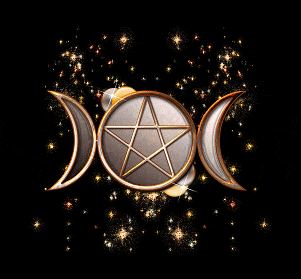Paganism was originally a pejorative and derogatory term referring to polytheistic/ animistic/ indigenous people's around Palestine at the time of the Roman Empire being established (50BCE) implying a backward mindset. Paganism has come to broadly connote the "beliefs of the peasantry". During and after the Middle Ages, the term paganism was applied to any unfamiliar religion, specifically belief in mythical and ancestral gods. All old-world religions, besides the monotheistic, main world religions, specifically non-Christian or pre-Christian religion were considered pagan, and mocked as 'pagus' or 'pagani'. (superstitious fool)
The modern Pagan movement incorporates beliefs or practices from outside the main world religions also, drawing especially from nature centric worship.
Nature-centric Earth awareness.
Paganism is a nature-based religio-spiritual system and way of life that draws its inspiration from Nature, acknowledging Nature as a manifestation of Divinity. The recognition of the Divine in nature is at the heart of Pagan belief. Pagans are deeply aware of the natural world and see the power of the divine in the ongoing cycle of life and death.
***
Some pagans are more animistic than ritualistic and treat other beings, animals and inanimate objects (like their magic tools) with the respect afforded a conscious being.
Most Pagans are eco-friendly, seeking to live in a way that minimizes harm to the natural environment or at least fostering an awareness of sustainability.
Adherents to ancient beliefs, classified as pagan, did not identify as 'pagan' themselves, whereas modern pagans identify with the term because it defines a specific genre of revised ancestral and indigenous tenants and more specifically renounces the Roman (Catholic) Empires imposed Christianity on our forebears.
There are many differences between ancient and modern pagans. Modern Paganism includes modernisms, developed in the 20th century in an attempt to reconstruct our legacy, since no substantial authentic written records exist of spiritual practice.
It likewise excludes the ignorance and superstitious matrix that was very real to our ancestors in day to day life.
While modern Pagans can be attracted to the light path (endeavoring to attain a spiritual enlightenment by practicing) a dark path (using occult magic to invoke their own power regardless of ethics) or no path, in the case of Heathenry (just living like the evolving creature we are, comfortable with both carnal and spiritual existence) Pagans are essentially individuals. Pagans engage in magickal practice in so far as it is part of a sound spirituality and reject any form of magick and magickal thrill seekers that seek(s) to overthrow the ambit of the laws of natural magick
We are balancers of light and dark forces in our own lives and in understanding the world we share striving to avoid damage to any form of life.
Pagans generally embrace both the sacred male and the sacred female. We personify the ultra-masculine and ultra-feminine aspects of nature and fertility (in celebration of rebirth and survival of our consciousness as a species- not to lewd or perverse ends. (as the media would stereotype)
We uphold and honour life. We acknowledge the cycle of ebb and flow of birth and death, creation and destruction, and the inherent value of life. In this experience we are not so arrogant, certain or concerned with what comes after life on earth.
Living Paganism
In order to live the best life, we attempt to live each day to its fullest. To balance the wisdom and benefits of ancient Pagan ways with the circumstances and demands of modern Pagan life.
To harm no other being, while expressing our individuality. Pagans do not discriminate against anyone on the grounds of gender, sexual preference or race. We subscribe to the principal of tolerance and choose to live in peace and strive to exist in harmony with all.
To learn the rules of nature and life before bending them, so that we understand and are accountable for the consequences. To never compromise our principles, except out of love and compassion. And to live a life, grateful for whatever we manifest, as it is by our choices, after all. To not blame supernatural forces or others for our circumstances. To not judge our circumstances by our expectations or ego, but rather as what the universe has in stall for us, despite our mundane plans. And to die grinning into the blade. To know that we have nothing to fear and have lived our lives to the fullest.



No comments:
Post a Comment
Note: Only a member of this blog may post a comment.